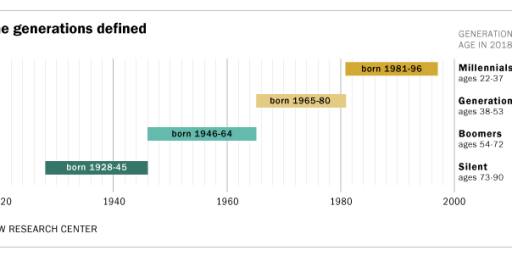Republican Apocalypse … Now?
David Brooks joins the long line of commenters predicting the GOP's demise.

Analysts have been predicting the demise of the Grand Old Party for years, arguing that a base consisting of old, white people is unsustainable. The erstwhile Republican David Brooks says it’s finally going to happen this time.
The generation gap is even more powerful when it comes to Republicans. To put it bluntly, young adults hate them.
In 2018, voters under 30 supported Democratic House candidates over Republican ones by an astounding 67 percent to 32 percent. A 2018 Pew survey found that 59 percent of millennial voters identify as Democrats or lean Democratic, while only 32 percent identify as Republicans or lean Republican.
The difference is ideological. According to Pew, 57 percent of millennials call themselves consistently liberal or mostly liberal. Only 12 percent call themselves consistently conservative or mostly conservative. This is the most important statistic in American politics right now.
Recent surveys of Generation Z voters (those born after 1996) find that, if anything, they are even more liberal than millennials.
—New York Times, “The Coming G.O.P. Apocalypse: Stumbling blind into the age of diversity.”
This is somewhat different than, albeit related to, the rationale relied upon by previous doomsayers:
In 2002, John B. Judis and Ruy Teixeira wrote a book called “The Emerging Democratic Majority,” which predicted electoral doom for the G.O.P. based on demographic data. That prediction turned out to be wrong, or at least wildly premature.
Folks like Judis and Teixeira argued that, as Hispanics increased their share of the population and old whites died off, the Democrats would gain the upper hand. Additionally, they saw an alliance forming between young voters, women, and racial minorities along ideological lines. While some of that indeed came to pass, the transformation was slower than projected because, as it turned out, Hispanics aren’t a monolith and many of them found common cause with Republicans.
But Brooks nonetheless thinks the tide is turning and the result inevitable if the GOP doesn’t radically shift its policies.
But it’s hard to look at the generational data and not see long-term disaster for Republicans. Some people think generations get more conservative as they age, but that is not borne out by the evidence. Moreover, today’s generation gap is not based just on temporary intellectual postures. It is based on concrete, lived experience that is never going to go away.
Unlike the Silent Generation and the boomers, millennials and Gen Z voters live with difference every single day. Only 16 percent of the Silent Generation is minority, but 44 percent of the millennial generation is. If you are a millennial in California, Texas, Florida, Arizona or New Jersey, ethnic minorities make up more than half of your age cohort. In just over two decades, America will be a majority-minority country.
Young voters approve of these trends. Seventy-nine percent of millennials think immigration is good for America. Sixty-one percent think racial diversity is good for America.
They have constructed an ethos that is mostly about dealing with difference. They are much more sympathetic to those who identify as transgender. They are much more likely than other groups to say that racial discrimination is the main barrier to black progress. They are much less likely to say the U.S. is the best country in the world.
Brooks is almost certainly right that these folks won’t age out of tolerance. And, while the Republican Party seemed to grasp this and made some inroads with minority voters as far back as George W. Bush’s “compassionate conservative” campaign, the base ultimately rejected that push with the Tea Party and, especially, Trump.
These days the Republican Party looks like a direct reaction against this ethos — against immigration, against diversity, against pluralism. Moreover, conservative thought seems to be getting less relevant to the America that is coming into being.
Matthew Continetti recently identified the key blocs on the new right in an essay in The Washington Free Beacon. These included the Jacksonians (pugilistic populists), the Paleos (Tucker Carlson-style economic nationalists), the Post-Liberals (people who oppose pluralism and seek a return to pre-Enlightenment orthodoxy). To most young adults, these tendencies will look like cloud cuckooland.
I’m a 53-year-old Southern white man, veteran, and voted for every Republican Presidential nominee from 1984 through 2012 and I think it sounds cuckoo.
Despite his dire predictions, Brooks is relatively optimistic:
The most burning question for conservatives should be: What do we have to say to young adults and about the diverse world they are living in? Instead, conservative intellectuals seem hellbent on taking their 12 percent share among the young and turning it to 3.
There is a conservative way to embrace pluralism and diversity. It’s to point out that there is a deep strain of pessimism in progressive multiculturalism: blacks and whites will never really understand each other; racism is endemic; the American project is fatally flawed; American structures are so oppressive, the only option is to burn them down.
A better multiculturalism would be optimistic: We can communicate across difference; the American creed is the right recipe for a thick and respectful pluralism; American structures are basically sound and can be realistically reformed.
I no longer share Brooks’ optimism, largely because I believe his premise wrong.
For years, I remained within the GOP fold even while criticizing the direction in which it was headed because I saw signs that reform was possible. While the grassroots of the party were going harder right, they continued to nominate saner voices like Bush, John McCain, and Mitt Romney at the top.
And, historically, we’ve maintained the current two-party system since 1860 because the parties were what political scientists call catch-all parties and naturally evolved over time in response to changing social mores and voter preferences. It seemed inevitable that the Republican Party would become more appealing to black and Hispanic voters and more tolerant on the social issues because, well, that’s what had always happened. Indeed, I’d seen the Democratic Party go from virtually unelectable at the Presidential level to virtually unbeatable within my own time being keenly interested in politics.
It hasn’t happened, though, and all the signs point in the opposite direction. The party has gone much harder right on some issues and doubled down on its nativism. And it’s because Brooks is fundamentally wrong: American structures are broken and can’t be realistically reformed.
The Senate and Electoral College, designed as a necessary compromise in turning a confederation of 13 independent states into a union, magnify the power of retrograde voters while substantially muting the forces Judis, Teixeira, and Brooks point to. And the Constitution is essentially not amendable, given a requirement to get consent of three-fourths of the states.
So, the 2016 election, which should have been a wake-up call for the GOP in which the most unpopular Democratic nominee in memory received 3 million more votes than the racist, xenophobic, misogynistic Republican wound up being instead a victory because of those broken institutions. And what should have been a wave election rebuking Trumpism in 2018 wound up being a mixed message, as Republicans actually increased their majority in the Senate—and thus solidified control over the judiciary.
The generational revolution to which Brooks points only matters if it’s not concentrated in the major metropolitan areas. Otherwise, the red states stay red and there are enough of them to win the White House occasionally and stop progressive legislation via the Senate when they don’t. And perhaps have a backstop on the Supreme Court for another generation just in case.






James, excellent summary, and very depressing – if Brooks thinks that the GOP is doomed, then we are headed to the 100 Year White Reich. The man is more of a negative indicator.
The GOP agrees with you James. As long as they can maintain veto points without changing, they won’t.
Sadly this. And it is work noting that over the last two decades or so the Republicans have maximized the breaking of these intuitions to maximize and extend their control.
I guess if we are looking at the very long view this will eventually have to change, but the reality is that, for the foreseeable future, I think nothing changes.
I’m big into structural and demographic explanations, so I also think that on average in the short to medium-term the Senate is hopeless, but at the same time just a few years ago Democrats had 60 votes in the Senate. Can somebody explain to me how that happened? Was it a unique result of bizarre circumstances, or can make it happen again? (And yeah I’m aware that 60 Democrats doesn’t mean 60 progressives, and that the filibuster still has to go to have a functioning government, but at least we wouldn’t have a corrupt piece of hideous garbage blocking everything.)
@Teve: The short answer is that the parties were still in the process of separation. There were still conservative/right-wing Democrats and liberal/centrist Republicans.
At this point there are only liberal/centrist Democrats and right-wing/batsh*t Republicans.
Change “Southern” to “Midwestern” and you’ve described me as well.
I must, with sadness, also agree with you that Brooks is far too optimistic. Our institutions as currently constituted (pun intended) will mitigate the factors he claims doom the GOP.
I mean, look at an issue currently before SCOTUS: the census citizenship question. Does anyone really think, even in the face of very strong evidence the question is intended to advantage “Republicans and non-hispanic whites,” that the current SCOTUS will disallow it? Of course they won’t. It will go into the census and the structural biases that favor the conservative white minority will be cemented ever more firmly in place.
@Teve: Throughout the Obama years after the 2010 midterms, I kept hearing about how Dems regaining the House would be hopeless for the foreseeable future due to the structural factors.
I remember in 2002 when that damned book came out. All the other Democrats who discussed it were just giddy over the prospects, but I said even then that the GOoPers could delay that coming Democratic Majority for quite a while if they brought back Jim Crow and applied it to Hispanics as well. And they might delay it indefinitely if Republicans turned America into an apartheid state.
@Kylopod: TBF the referred to structural factors, a (un)natural rural weighting of congressional districts and gerrymandering among them, were against DEMs. It took a huge turnout to get as many seats as they did.
@Barry: You give the democrats too much credit. They are in fact still breaking into their new factions. And the Democratic Socialist Wing is why the GOP isn’t going away. They not only keep folks on the right from voting for Democrats at all, but they keep the Centrist Democrats from showing up at the polls in some places. They are basically the third party that screws up the election for democrats, but they do it from within.
Yeah, you’ll get a bunch of them elected in California and in urban centers. But you aren’t going to get one in office from Albert Lea or Des Moine. But getting one on the ballot in those cities will keep the remaining centrist democrats at home.
Also, I just saw this at Balloon Juice in response to this post and I thought I’d share it:
@Bob Beller:
While probably accurate, this comment also ignores the extent to which voters in red states are perfectly fine with Republicans who sponsor Socialist policies like our current “Farmer Welfare” policy. The dirty little secret of contemporary politics is that Republican voters would be quite happy to live in a Scandinavian utopia so long as the benefits of Socialist policies accrued only to People Like Them and never to Those Other People.
@Citizen Alan:
That Hillary Clinton was the least popular Democratic nominee in my lifetime is simply beyond dispute. Indeed, she was the least popular major party candidate EVER — with the exception of Donald Trump.
The Trumpers using their government-bought mobility scooters to scoot to the mailbox to get their disability check don’t have a problem with socialism in practice, they have a problem with those young bucks and their damn T-bones.
@Kylopod:
Hopeless was hyperbole. But the reality remains, as I think you’re well aware, that due to gerrymandering and the cap on the number of members, Democrats have to significantly out preform to make and maintain their gains.
And given the Supreme Court has signaled that it’s going to most likely uphold the right of legislatures to politically gerrymander and that the Commerce Department has the power to include the citizenship question (even if it’s roots are inherently tied to a plan to advance racial politics) then this isn’t going to change. That’s before we get to voter disenfranchisement.
And it’s worth noting that this is being repeated at the state level at well (see for example Michigan).
Yes it will be possible for the Democrats to maintain control of the House, but to James’ point, the institutional framework has been gamed to the point of being broken by the Republicans.
@James Joyner:
True, but that does not change the gratuitousness of your swip.
@Citizen Alan:
I’m not sure I follow your logic. It’s true that my comment was gratuitous in that I offered it free of charge. But it’s not uncalled for or unjustified; the fact that she got 3 million more votes despite that enormous handicap should have translated into a landslide. Instead, she lost.
@James Joyner:
Of course she should have, but another of those pesky institutions dictates the winner of the popular vote–no matter how outsized the win–can still lose the election.
@Mikey:
Right—that was the point of my bringing it up! I was reinforcing the point made in the previous paragraph: “The Senate and Electoral College, designed as a necessary compromise in turning a confederation of 13 independent states into a union, magnify the power of retrograde voters while substantially muting the forces Judis, Teixeira, and Brooks point to.”
@Barry: While I agree with you in general, it was not an out of the blue, passive process. Conservative Ds were southern, and went away largely because of the success of the Rs’ Southern Strategy, which led to the south flipping to R. Liberal Rs have largely gone away for basically the same reason. Since the Kochs astroturfed the Tea Party, Rs can win primaries only by playing to the base.
Republicans can only win by activating any social divisions they can find, god, guns, and gays. This division isn’t an inevitable natural development. Republicans did it.
@James Joyner: That also isn’t just the way things were. Hillary polled very well as Sec of State, but the GOP character assassination machine, aided and abetted by the supposedly liberal MSM, were able to weaponize Benghazi!!!, HER EMAILS, and the squeaky clean Clinton Foundation. You may fairly argue that’s just politics, but it wasn’t just the way things were, it was created by Republican ratfracking.
Per Sides et al in Identity Crisis, Trump won by activating racism. GOPs can only win with division and destruction. They aren’t taking advantage of naturally occurring fault lines, they are actively creating and exacerbating them.
there’s a new piece up in the Washington Post right now about how several Congressional Republicans were talking openly about impeaching Hillary for her emails possibly before she even was inaugurated.
And one fiscal division: taxes–and this resonates. Over and over, all a Republican needs to repeat is “you’ll pay more in taxes.”
I don’t think I can emphasize this enough–Americans are alarmingly receptive to the notion that if an idea costs them a nickle more in taxes, it probably isn’t needed or shouldn’t be done. This is how Republicans have gotten away with running up the nation’s credit card, with few ramifications at the ballot box.
@gVOR08:
Oh, I think that’s right. Probably the right-wing media moreso than the pols but the latter are contributing as well, especially in the post-Tea Party and Trump era.
@James Joyner: Ah, I get it, I misunderstood you. Apologies.
@Teve:
Don’t forget geographic explanations. The Iraq war caused a blip in the longish-term trend of the Midwest slowly but steadily following the Southern shift to Republicans. Over the same period there has been a trend for the West to move Democratic. Consider that Clinton got 104 electoral votes from the 12-state NE urban corridor, 98 from the 13-state West, and 30 from the other 25 states. If the Democrats hadn’t flipped two US Senate seats in western states last year, there would be no chance of the Dems winning control of the Senate in 2020. If the Dems can’t flip two more Senate seats in the West in 2020 (CO and AZ), they almost certainly won’t get control.
I wouldn’t write off the GOP just yet. If and when Trump or his actions cause a disaster, you’ll find out many Republicans, in a most Trumpidian way, will claim never to have supported or liked him, and move on.
@mattbernius:
Following up on the point about some of the gaming the system and it’s effect on the control of congress and state governments:. There’s a new academic monograph that really dives into the topic:
https://www.economist.com/democracy-in-america/2019/06/03/how-americas-urban-rural-divide-shapes-elections
This is another one of those “you keep using that word but I don’t think it means what you think it means” situations. Recent surveys of college campuses belies the idea that that age group are liberal given their opposition to free speech, tendency to attack the disfavored economically and physically.
On factor to consider, as shown in this collection of a Twitter feed by Zack Goldberg, is you are being manipulated by the NY Times. Media in general, on both sides, in reality. Lot of hockey stick graphs there on the frequency of words, such as social justice, whiteness, diversity and inclusion in the NY Times. If you don’t exercise a lot of intellectual and emotional discipline, you could come to believe that Apartheid is on the rise in America. Step away from the social media manipulation.
All, I can say as someone who doesn’t live in the NY Times, WaPo, Facebook newsfeed bubble, this post sounds crazy to me. We don’t exist in the same America apparently. After 2016, social media algorithm controllers are disabling all their safeties since Trump closed the distance before their torpedoes armed last time. We’ll see how that works out with the votes depending on which current America people use as the basis of their vote in 2020.
@Kathy: Not so sure about that. trump will just convince the deludeds that losing their jobs, houses, and the clothes on their backs in a 2nd great depression is really a good thing for them as they are now free to move without the encumbrances of possessions and they will believe him.
The scary thing is that the lack of popularity for conservatives is only going to make it worse. Nobody likes to be rejected, especially people who feel they’re entitled to being in control. Reading some of these nutjob the White Walkers are coming for conservatives or Rod Dreher talking about woke dhimmitude because some local library has a drag hour of storytelling…it’s going to get worse and worse and make conservatives demand even crazier judges and politicians.
I’ve used this quote from Jane Mayer, Dark Money here before, but it’s apt on this thread. David Koch ran for VP on the Libertarian ticket in 1980. He ran only because as a candidate he could pump family money into the campaign without limit. They got 1%.
The Kochs, well Charles now, have put huge amounts of money, their own and others’, into politics. They seem to have reconciled with Trump. After all, as Grover Norquist said, they only need a prez to sign his name. Since they’re sitting atop the pyramid now, they don’t really need anything. They can be content with just blocking. Mostly blocking any effort to not extract and burn every last ounce oil. They cannot get what they want democratically. James point is spot on, the Senate, and less so the EC, are anti-democratic and Koch can use them as the tools to maintain veto power over democracy. With any luck Ds will get the presidency in ’20. But we may then just be back to the two party, two term, two step with the presidency alternating every eight years and McConnell and the Rs continuing control of the Senate. This may be survivable, but if, say, Trump were reelected and Adelson were to buy NYT we could be in deep trouble.
@gVOR08: I haven’t heard much about Identity Crisis and unfortunately my local liberry doesn’t have it. I see this line in a review though “Racial and religious anxieties, more than economic worries, fueled Donald Trump’s victory.” and think, yep.
I’m looking to see if I can find a more extensive summary.
this looks good:
https://www.washingtonpost.com/news/book-party/wp/2018/11/01/feature/trump-didnt-invent-american-bigotry-but-new-books-argue-that-he-released-it-and-he-has-no-incentive-to-extinguish-it/
@OzarkHillbilly:
That’s possible, too. In fact, if Dennison is booted out next year, and the recession hits in the next administration, few Republicans will blame him for it. And then they’ll spend the next 30 years moaning about the lack of another Cheeto.
And it doesn’t mean a thing if they don’t vote. My state is aggressive about registration — we manage to get about 90% of eligible voters to register. We make it as easy as possible to vote — we mail the ballot right to your home, and you can drop it in any mailbox you pass to return it; or you can go to a voting center if you really want to vote in person — and we can only get about 75% of registered voters to cast a ballot. The non-voters are disproportionately younger. Almost all states do worse at getting people to vote than we do.
For 30 years I’ve been told that the old folks would die off and all those votes for conservatives would go away. Guess what? Still lots of old people, still voting for conservatives. Why does anyone think the Millennials will be any different?
David Brooks: Young People With Their Guacamole Bread & ‘Diversity’ Are Killing The GOP
@Teve: Looks like a fair short summary. A few other points of interest were that social media was probably not nearly as influential as everybody seems to think and being a woman helped Hillary slightly with women, but hurt her with men with traditional attitudes. There was a record gender gap, but it was all lower support from men.
@Michael Cain:
Let’s be clear what we mean by “the West.” The Southwest is headed in a blue direction, and the Pacific Coast is already as blue as New England. The northern Mountain States and the Great Plains are as red as they’ve ever been.
@Kylopod: Nevada too.
eta DOH! it occurs to me you include nevada in the southwest. my bad.
@Kylopod: Yeah, Census Bureau definition of West. For assorted sound reasons, the Dakotas, Nebraska and Kansas are Midwest; Oklahoma and Texas are South. For EC purposes, saying ID/MT/UT/WY are as red as ever (in a blue-trending West) is about equivalent to saying Illinois is as blue as ever (in a red-trending Midwest). More important in the Senate, of course, since ID/MT/UT/WY get eight.
@Teve:
It was largely a fluke–60 vote majorities are extremely rare (somewhere I looked up the history and blogged about it, I think). And the 60 vote margin the Dems had in 2009 was brief and had a number of weird elements to it (including a post-election party switch, a death, a drawn-out electoral fight, and a number of vacancies due to so many Senators moving into the Obama administration, etc.).
New England is interesting. Vermont has a Republican governor, same with New Hampshire and Massachusetts. Maine just recently got rid of the execrable Gov. Paul LePage. Here in NH, our state legislature swings from D to R control fairly regularly, and we’re considered a “purple” state, and yet our entire federal delegation are Democrats–and this holds true for other New England states, I think Susan Collins is the only remaining Republican (and with any luck, she’ll be gone in 2020).
Yes, in some ways these are “different” Republicans than one would find in the Midwest, but in other ways they are the same, but I guess the overriding point is that even areas that look solidly blue still have some tinges of purple in them.
Regarding young people and voting: yes, they need to get out and vote. This has long been a problem and it is worse for Democrats when there’s a lack of enthusiasm. Think of all of the “meh” presidential candidates–Dukakis, Mondale, Kerry, and yes, Hillary Clinton–any time there is a candidate at the top of the ticket that Dems don’t find “exciting” they end up losing. This is why an “enthusiasm gap” matters. Young, dynamic, hopeful candidates (B. Clinton, Obama) win.
This is the Democrats fall in love/Republicans fall in line theory of voting and I sincerely hope that this nonsense is set aside in 2020.
Unfortunately, Republicans are not going away.
Unless The South decides it wants to re-secede, this is what we’ve got.
@Jen: Free lunch. It’s as American as apple pie. We don’t dislike programs; we dislike paying for them. (And of course, when those “undeserving parasites” get stuff.)
@JKB: I’ll agree with you on Apartheid not being on the rise. But it’s not from a lack of trying on the right. The history is deep and far reaching.
@Michael Cain: I don’t find the Census definitions that useful for these purposes. For example, the Census still classifies Maryland and Delaware as part of the South. I’m interested more in how the regions unite based on politics. That’s why I’d use the following classifications: the Pacific Coast (CA, OR, WA), the Southwest (NV, UT, CO, AZ, NM, and maybe TX–more on that in a moment), the northern Mountain states (ID, MT, WY), and the Great Plains states (the Dakotas, NE, KS)–which may be considered part of the Midwest but are clearly distinct politically from any of the states to their east and from what I’ve seen tend to be ignored in most discussions of the Midwest as a political region.
Even these divisions aren’t perfect. As you point out, Illinois is a lot bluer than most of the Midwest. Similarly, Utah is very red compared with other Southwestern states. Nevertheless, I think these are useful divisions. Even the apparent exceptions aren’t as anomalous as they may seem at first (e.g. one of the underrated reasons for Obama’s success in the Midwest was his being from Illinois; it was a big part of why he won Indiana in 2008). And some states are somewhat transitional in character, such as Texas, which despite being part of the former Confederacy shares some Western qualities and has been undergoing some of the same political and demographic shifts affecting NM, Arizona, and Nevada.
@Jen: It’s worth keeping in mind that it’s quite common for governors to be elected in states dominated by the other party–much more frequently than Senators or presidents. So you have Democratic governors in Montana, Kansas, and Louisiana; Republican governors in Maryland, Massachusetts, and Vermont.
Also, NH has long been relatively the most Republican state in New England. Maine is a bit eccentric, in that its electorate has a strange taste for voting for independents, which not only gave us Angus King, but also LePage (a far-right loon who was elected with pluralities twice while an independent candidate split the Democratic vote–there’s a reason it’s the first state to institute ranked-choice voting). At this point, I think Susan Collins is somewhat of an anachronism in the state, like Joe Manchin in WV.
@Steven L. Taylor:
I should add that 60 has only been a magic number since the 1970s, when the threshold for cloture was dropped from two-thirds to three-fifths. In that period, only Carter and Obama enjoyed a filibuster-proof majority during part of their presidencies. There were previous presidents who achieved two-thirds majorities in the Senate (FDR, JFK, LBJ), though it wasn’t as significant as it may seem today in terms of stopping a filibuster, since filibusters were rarely used, and one of the chief times they were used was when Southern Democrats wanted to stop civil rights legislation, so Dems like LBJ were mostly battling members of their own party, not the Republicans. Nobody tried to filibuster Medicare or most of the rest of the Great Society programs.
@al Ameda:
Have you thought of trading it to Great Britain, sans nukes and heavy weapons, in exchange for them keeping Trump confined to the Tower of London?
@Teve: Is this the David Brooks of the quadrennial discovery of an “American Centrist political party?” If so, the reports of the GOP’s demise may be somewhat exaggerated.
@Just nutha: Past success may not be indicative of future performance. Time was, everything Bill Kristol said was guaranteed to be the opposite of the truth. Then he said Trump sucked and would be a terrible president…
@Kylopod: Indeed–the usage of procedural filibusters to essentially turn the chamber into one that that requires a super-majority to function (especially in terms of blocking major legislation), is a recent one.
@Teve: Nice.
Brooks is completely wrong at a fundamental level. There is no conservative way to embrace diversity, or to promote social justice, or to empower women, or to fight against increasing wealth disparity, or to treat both Christians and gays the same way everyone else is treated under the law. If you want to do those things, you are not a conservative. There is no conservative path to progress.
@DrDaveT: he seems to be saying that conservatives can win over young diverse gay people by saying that, well, post-modernism can be divisive.
I haven’t read a David Brooks column in over a decade because it’s not an exercise in serious political philosophy. it’s an exercise in what’s the absolute smartest cleverest most potentially justifiable way I can try to justify horrible Republican bullshit. The best he can ever be is moderately not utterly failing.
@Steven L. Taylor:
To that point, is there a good history of this shift? I’d love to read an accurate account of this becoming the norm.
@mattbernius: I would point you in the direct of the work of Sarah Binder (including at the Monkey Cage) and Gregory Koger. I do not have a slam-dunk example off the top of my head, however.
Quoted from Brooks:
Generation X would like to remind you that not only do we exist, but we have a perfectly serviceable book about us from Douglas Coupland…
Roughly 40% of America is captured baby the Right Wing Bullshit Network — from Fox, to Limbaugh to the more flamboyantly crazy.
Every story about how Republicans are doomed might as well be saying “luckily no one else will be caught in that idiotic trap”, ignoring how many (formerly) perfectly reasonable people have fallen for it.
@Steven L. Taylor:
Thanks. Somehow the Monkey Cage fell off my radar.
@Kathy: Well, British Airways DID recently start service between Charleston and London. Maybe it’s a harbinger of things to come.
@Gustopher: And that author, Coupland, was born in 1961. So he’s a boomer.